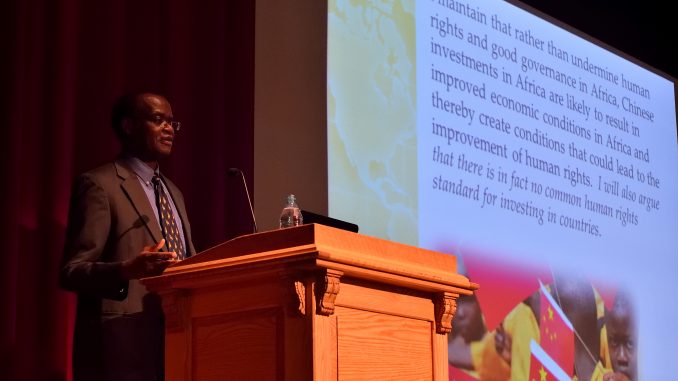
Cady Kuzmich, News Editor
SUNY Oneonta held its sixth undergraduate Political Science Conference on Friday, March 14 in the Hunt Union Ballroom. From 9:30 a.m. until 3:45 p.m students presented on topics ranging from the LGBT movement in Haiti, to the “CNN Effect” and the economic implications of hosting the Olympic Games. Students, professors and other attendees took a break from student presentations at 2 p.m. for the Keynote Speech by Dr. Muna Ndulo, a Professor at Cornell Law School and Director of Cornell University’s Institute for African Development.
With experience working for the United Nations Development Program (UNDP), the World Bank and the United States Institute for Peace, Ndulo offered a unique perspective on developing Chinese-African relations. Throughout his presentation, Ndulo addressed what Chinese involvement means for African development. He focused more on the numbers and less on social implications and real life examples which may have made more of an impression on students.
Many in the Western world have expressed suspicions and uneasiness regarding Chinese involvement in Africa, citing potential for human rights violations. The 2014 Freedom House report shows China with a rating of “Not Free,” the worst rating of political rights and equally unimpressive civil liberties. Why then, skeptics argue, would Chinese look out for the rights of Africans?
Ndulo reminded his audience that China’s interest in Africa is nothing new. Between 1956 and 1977 China provided $2.5 billion in aid to thirty-six African countries. Chinese support played a rather important role in the African fight against colonialism in the 1960s and 70s. Ndulo pointed out that Western nations, at that time, were on the wrong side of history, often propping up violent dictators.
While the Chinese have been investing in Africa for decades, these relations have been strengthened in recent years. Trade between Chinese and Africa is now at roughly $120 billion—a drastic increase from only $5.6 billion in 1996. Ndulo attributes this spike in trade to the China-Africa forum in Beijing that took place in 2000. Many argue that China is exploiting their relationship with African nations for access to raw materials. Yet, the US gets more oil from Africa than China does.
Ndulo emphasized the importance of listening to what Africans have to say about their relationship with the Chinese. He explained that the African voice is often ignored or lumped together, and reminded his audience that Africa is not one nation, but many individual nations with unique interests. Going on, he added that investment and human rights issues ought to be assessed by a more manageable and methodically efficient country-by-country basis. “There is no single story and we should always be suspicious of people who present a single story” said Ndulo. He explained that “The era of generals running African states seems to be over.”
Ndulo was hopeful that Africa would rise in the global economy and that once economies stabilized, human rights would be propelled to the forefront of policy. Improved infrastructure enables countries to better provide basic services like education and healthcare. Socio-economic rights are inherently linked with the health of the economy, argued Ndulo.
Westerners warn Africans of Chinese greed, yet Ndulo says that many Africans view the Chinese interest as refreshing. According to Ndulo, while ‘Westerners look on Africa like a sick patient, China seeks a partnership.” Ndulo went on to describe how the Chinese demand much less and are able to live like their African workers, while their Western counterparts are accustomed to things like air conditioning, television, etc. According to Ndulo, the Chinese are “willing to go where western workers fear to tread.” Who can blame Africans for wanting a more equitable, non-paternalistic trading partner?
Ndulo argued that it all comes down to accountability and that the buck stops at the country. Ndulo urges the international community to hold investors accountable regardless of nationality and emphasized the importance of increasing capacity for African governments to regulate these investors.
Ndulo’s presentation provoked several questions from students and faculty in the audience concerning the fate of Africa. Students asked what African governments can do to decrease the amount of international interference in their decision-making processes, the possibility of a more unified Africa and whether the African people have any say in the decision to allow Chinese investors access to the country. SUNY Oneonta Political Science and ALS professor, Dr. Robert Compton shared his thoughts on the event, saying “Although there weren’t as many presenters as compared to the past, the conference was a success based on the quality of the papers and the gamut of issues covered. It shows that our students, when challenged, are capable of producing significant research with real world implications. In addition, the keynote speaker addressed an important issue regarding trade and human rights within the context of a rising China.” Overall, despite low turnouts, the quality of student presentations and an informative keynote speaker ensured the conference was a success.
Leave a Reply